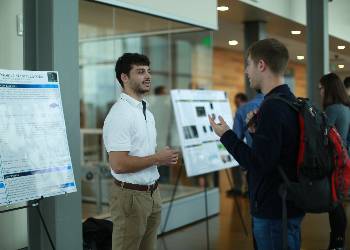Apply For Undergraduate Research
Key features of SURF:
- Awards will be made in the amount of $7,200 for the undergraduate student stipend.
- Student participants must be named in the application; applications that list “TBN” students will not be reviewed.
- Student participants, as a condition of the award, must: (1) attend a “kick-off” meeting in May/June; (2) attend a session on poster preparation in August; and (3) present a poster on their research findings at the annual OCOE Undergraduate Research Day. Friday, November 6, 2026.
- Students who received an award in 2025 and did not participate in the 2025 Undergraduate Research Day Poster session will not be considered for an award in 2026 (unless they were excused from participation by Ms. Jamiola).
How to get started:
- Determine a potential research area of interest
- Identify a faculty member in the Opus College of Engineering who has related research interests
- Meet with the faculty member and come to agreement on project
- Work with the faculty member to prepare and submit your grant application following the guidelines below.
SURF Program Proposal Guidelines
Proposals must address each of the categories listed below. Be sure to clearly label each category within your proposal. The entire proposal should not exceed two pages. Please use Times New Roman 11 point font and 1” margins on all sides.
Proposal Categories:
- Participants and project title: Construct a clear and concise title and list the faculty participants and the student. It is necessary to identify the student participant at the time of submittal.
- Student Statement: Statement by student indicating why they are interested in this research project and how a summer research experience fits into their career goals.
- Short overview of the project including proposed activities: Brief summary of the faculty research project in which the student will be participating. The student’s role in the larger faculty research project. Include a brief description of how the project will benefit from the work of the undergraduate research assistant. Include how the student will benefit from the experience.
- Specific research objectives and proposed outcomes: Provide the research objective related directly to the student’s work. List the activities that the student will conduct to meet the research objectives. Describe how the results of the study will be disseminated.
- List location of proposed research project, lab room numbers, etc.
- Time frame for project (start and end dates)
- Describe outcomes from previous award, if any
Qualifications:
- Participants must be an undergraduate in good standing during the proposed work period.
- Proposals must include a research-active faculty mentor as evidenced through recent grant activity (applications/awards). Proposals that do not include both a student and faculty mentor will not be considered.
- Proposed funded activities can take place April 1 - December 31 and should have a concentrated effort during the summer.
Reporting:
Faculty recipients from funded proposals are expected to generate a short summary of research activities and an assessment of the impact this had on their research output at the end of the grant period.
Deadlines:
Proposals should be submitted electronically to Karen Jamiola, Engineering Grant Development Manager, no later than 5 p.m. CT on February 23, 2026. Proposal review will begin immediately thereafter.
SURF Review Rubric
The SURF Selection Committee will use this rubric to assess proposals, so this should be a guide for you as you develop your proposal. Please remember that a Level 1 proposal puts you in the running for funding but does not guarantee funding. As with most fellowships, the number of awards is determined by our funding.
Level 1 Proposal (high priority for funding): Score 1-3 (1=best)
- The proposal has a research question that is interesting, fresh, and significant for an undergraduate, and the proposal presents the ideas in an organized and compelling way.
- The research question is appropriate for this student, and the student statement is compelling.
- The research objectives and the proposed outcomes are reasonable for the scope of the project.
- The faculty expertise is a good match for the proposed project and the faculty mentor is grant active.
- If the faculty member had a prior SURF student(s), they reported on the award(s) in a timely fashion and the student(s) presented at Undergraduate Research Day.
Level 2 Proposal (acceptable for funding, but lower priority): Score 4-6 (4=best)
- The proposal has a research question that is interesting, but may or may not be particularly original or significant, and/or the ideas are presented in an organized, but not particularly compelling way.
- The research question may or may not be appropriate for this student, and the student statement is adequate, but not very compelling.
- The research objectives and the proposed outcomes may be too ambitious or not ambitious enough for the scope of the project.
- The area of faculty expertise may be outside of the main focus of the project and/or the faculty member is marginally grant active.
- If the faculty member had a prior SURF student(s), they were delayed in their reporting on the award(s) and/or the student(s) did not present at Undergraduate Research Day.
Level 3 Proposal (unacceptable for funding): Score 7-9 (7=best)
- The proposal does not have a research question, or the question is one that has already been addressed. The ideas in the proposal are difficult to follow.
- The research question is not appropriate for this student, and the student statement does not compel the reviewer.
- The research objectives and proposed outcomes do not fit within the scope of the project.
- The research proposed is outside of the area of faculty expertise and/or the faculty member is not grant active.
- If the faculty member had a prior SURF student(s), they did not report on the award(s) and/or the student(s) did not present at Undergraduate Research Day.

